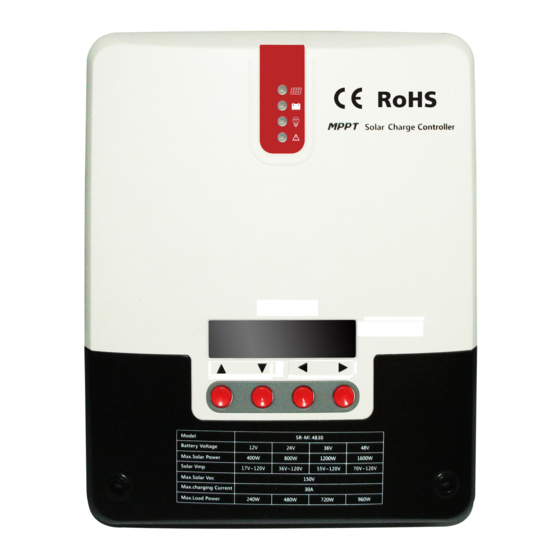
Srne ML Series User Manual
Solar charge and discharge controller, maximum power point tracking.
Hide thumbs
Also See for ML Series:
- User manual (33 pages) ,
- User manual (11 pages) ,
- User manual (32 pages)
Table of Contents
Advertisement
Quick Links
Material Code:102931
Maximum Power Point
Tracking ML Series
ML4830N15
Solar Charge and Discharge Controller
User Manual
Model
Batter y Voltage
Max Solar Input Voltage
Charging Current
Discharging Current
Version: 1.03
The above information is subject to change without prior notice.
ML4830N15
12V/24V/36V/48V
150V
30A
20A
Advertisement
Table of Contents

Summary of Contents for Srne ML Series
- Page 1 Maximum Power Point Tracking ML Series ML4830N15 Solar Charge and Discharge Controller User Manual Model ML4830N15 Batter y Voltage 12V/24V/36V/48V Max Solar Input Voltage 150V Charging Current Discharging Current Version: 1.03 Material Code:102931 The above information is subject to change without prior notice.
-
Page 2: Table Of Contents
Dear user: Catalog Thank you for choosing our product ! 1. Product Introduction 1.1 Product Overview and Features 1.2 Product Features 1.3 Introduction of the Maximum Power Point Tracking Technology Safety Instructions 1.4 Introduction of Charging Stages 2. Product Installation 1. -
Page 3: Product Introduction
1.2 Product Features 1. Product Introduction Battery Sampling 1.1 Product Overview and Features ITEM DEFINITION The solar charge controller can monitor generated power of solar panels in real time and track the highest voltage current value (VI), enabling the system to charge the battery with maximum power output. -
Page 4: Introduction Of Charging Stages
Compared with conventional PWM solar charge controllers, MPPT solar charge controllers bring out 1.4 Introduction of Charging Stages the maximum power of solar panels and provide greater charging current. Generally speaking, MPPT solar charge controllers can improve energy utilization rate by 15% ~ 20% over PWM solar charge controllers. -
Page 5: Product Installation
Equalizing Charging Loose connections and corrosive wires may cause extreme heat that melts wire insulation layers, burns surrounding materials, or even results in fire. Ensure that connection heads are screwed Warning: explosion! tight, and wires are better fixed with tightening belts. Avoid wire shaking and loose connection Balance opening lead-acid batteries may produce explosive gas, and cabins of the heads when moving the application. - Page 6 ⑤ Power On Tip: the ML series controller, set as the power of the lithium battery to connect the photovoltaic array to start the controller, is suitable for the lithium battery BMS to start the controller and activate the lithium battery when it is in the condition that the battery is in a protected state.
-
Page 7: Product Operation And Display
3. Product Operation and Display ERROR Indicator Indication State Abnormality indication 3.1 LED Indicator System Operation No Abnormalities Steady On System Abnormal PV array Indicator Indicate solar charge controller current charging mode BAT Indicator Indicate battery current state. 3.2 Buzzer LOAD Indicator Indicate load switch and state. - Page 8 During start, the four indicators flash in flow. LCD starts after self-check. The model of the solar charge controller is displayed first, and then battery voltage level is displayed. Voltage level is displayed according to user-selected fixed voltage or voltage automatically identified. ③...
-
Page 9: Load Mode Setting Page
3.5 Load Mode Setting Page Step ⑤ Long press setting key to save and exit Setting is successful Load Mode Introduction L O A D S E T M O D E The solar controller has five load work modes,with modes referred as follows: L i g h t S E L Description... - Page 10 Step ②: Press the +/- key to set the number of days 3.7 System Log Page 001 refers to value of previous day D A Y: B A T T E R Y Log View of Current Day 0 0 1 2 2 .
- Page 11 Chg-P :/% 3.9 Production Information Page 100% You can check the controller model, serial number, software and hardware version etc. to learn about the product. For detailed information, please see Table 3-9 System Information Name Item Parameter Example Example Note Model Model: ML4830N15...
-
Page 12: Product Specification Parameter
5. Product Specification Parameter 5.2 Parameter Adjustment Range 5.1 Electrical Parameter Comparison Table of Parameters for Each Type of Battery Setting Voltage Sealed Lead-Acid Gelled Lead-Acid Open Lead-Acid Li Battery User (User-Defined) Parameter Value Parameter Name Battery Type Battery Battery Battery Overvoltage 16.0V... -
Page 13: Conversion Efficiency Curve
6. Conversion Efficiency Curve 7. Product Size 6.1 12V System Conversion Efficiency MPPT 12V System Conversion Efficiency (12V Battery) 20Vmp 40Vmp 60Vmp 20 Vmp 90Vmp 110Vmp 40 Vmp 60 Vmp 90 Vmp 110 Vmp Output Power (W) 6.2 24V System Conversion Efficiency 4XФ10 4XФ4.5 MPPT 24V System Conversion Efficiency (24V Battery)









Need help?
Do you have a question about the ML Series and is the answer not in the manual?
Questions and answers